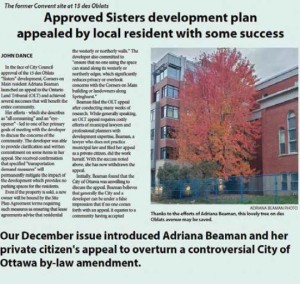Adriana Beaman

In our December issue of The Mainstreeter, John Dance reported on the efforts of Adriana Beaman, an Old Ottawa East resident, who challenged Ottawa City Council’s decision to approve by-law amendments sought by the developers of the former Sisters Convent property at 15 des Oblats Avenue. Her four-month battle to mitigate impacts of the development on neighbours and on the community included a private citizen’s appeal to the Ontario Land Tribunal (OLT).
In this two-part article, which concludes in our April issue, Beaman shares her experiences and perspective with others in the community who might consider challenging City of Ottawa local planning, zoning and development decisions. Part 1 below covers the initial public process associated with the City of Ottawa’s planning approval framework from Beaman’s initial filing of comments through to her appearance at the all-important Planning And Housing Committee meeting. Both parts of Beaman’s article are available now online at www.mainstreeter.ca.
Last summer and fall, I immersed myself in the appeal process to the Ontario Land Tribunal (OLT) from an approved City of Ottawa zoning by-law amendment that would have affected my neighbours and me directly.
Although I am a lawyer, I don’t practice municipal law. Unable to retain a municipal law lawyer for reasons described below, I embarked on this journey as a private citizen without representation. My four-month journey through the tangled web of Ottawa’s planning process and the OLT appeal process taught me many lessons.
In recent years, with increased media focus on developments such as Lansdowne 2.0, planning disputes in neighbourhoods across the City seem to have spiralled as provincial government policies such as intensification are implemented by developers who have embraced this planning vision. Unfortunately, our existing provincial legislation and local zoning by-laws have not caught up with recent provincial policies aimed at addressing the current housing crisis.
What I learned:Based on my recent experience, there are flaws that need fixing, chief among them, overly generalized legislation and policies that grant broad powers to city councils by way of recommendations of their planning committees, and equally broad discretion in the hands of the OLT to interpret and apply outdated zoning by-laws. As a result, development applications are now requesting extreme amendments to existing by-laws on the pretext that these new builds comply with provincial policies and official plans.
In my view, we all need to be forward thinking about our City’s future needs and quick to respond to economic and environmental changes. However, important development decisions must always be founded upon good planning principles and fair and transparent public process.
Initial Public Process
While property owners have property rights, they also have obligations to comply with the zoning by-laws. Property owners can apply for a variance or an exemption from the applicable by-laws. And even before applying to the City, property owners engage in a pre-consultation process with the City’s planning department regarding their proposed plans. The public is not involved and has no insight into the process until an owner actually files an application.
When the City of Ottawa sign went up for the proposed development at 15 des Oblats Avenue, it included the usual phrase, “Let us know what you think.” In response, like many other neighbours of mine who had valid comments, concerns and questions, I submitted comments on the redevelopment, including the proposed by-law amendments.
What I learned:The City planners assigned to these files have significant workloads, which is neither ideal for the employee nor for citizens like me who try to engage with these employees. Sadly, I learned that many of my neighbours received no response from the City to their emails, and thus received no answers to their questions and concerns. I also learned that despite the building owners’ desire to engage more fully with my neighbours and me, they followed the recommended consultation process established by the City and our Councillor. I concluded that key to the City making a good planning decision was providing citizens with a more engaging public consultation process right from the outset, one that included the assigned City planner, the affected City Councillor and the building owner.
Planning And Housing Committee Meeting
Once the required public consultation concludes, the City planner completes a report and recommendation and the matter is brought to the City’s Planning and Housing Committee (PHC), comprised of a selection of our City Councillors. As a member of the public, I was able to register to participate at the PHC meeting to voice my comments about the requested zoning by-law amendments. I was allotted five minutes to speak.
What I learned:I acknowledge that Councillors have significant workloads and, for time management reasons, they rely on staff reports and recommendations in their decision making. During my appearance before the PHC, I observed that when voting on the applications, the PHC also gave significant weight to the opinion of the Councillor in whose ward the property in question is located. But when I read the staff report to prepare for the PHC meeting and when I listened to the staff presentation during that meeting, I questioned some of the staff’s explanations and answers.
If you think there is an alternate interpretation of the provincial policies or the City’s Official Plan, or a possible error in the staff report, you should present this information at the PHC. I learned that it is important to know your Councillor’s position on the staff recommendation before the PHC meeting takes place. If your Councillor is in favour of the staff report recommendation that you wish to contest, it’s best to bring your concerns to your Councillor in advance of the PHC meeting and ask how community concerns are to be addressed or resolved.
I learned that City Council most often approves the recommendations of the PHC. The PHC’s recommendations are therefore critical. Because this is the case, keeping an open mind during PHC meetings is, in my opinion, a paramount aspect of a City Councillor’s role as a PHC member. Merely allowing citizens the opportunity to speak at PHC is not enough; Councillors must also listen to presenters without prejudgment or appearance of bias.
When Councillors are members of City committees, they should not allow their personal beliefs or interests to influence or predetermine their decisions. In performing their role as a PHC decision-maker, Councillors should be impartial and they should review all materials submitted to the committee on time, not only the staff recommendations. It is essential for City staff to ensure that PHC members have all the materials submitted by the public prior to the meeting, which I believe did not occur in this case.
I personally felt an apprehension of bias from one PHC member, and I should have voiced my concerns at the PHC meeting or to that PHC member in writing following the meeting, since possible bias is not an issue easily addressed in an OLT appeal. From my perspective, City Councillors would benefit from training in administrative law principles of procedural fairness. During the OLT process, I passed this suggestion on to the City solicitor assigned to my appeal.






